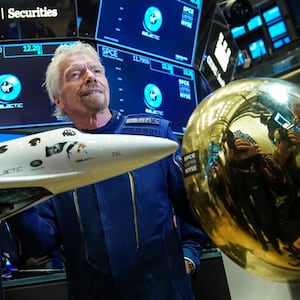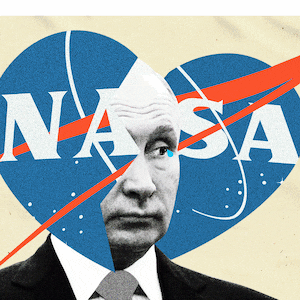The billionaires are at it again. Three of the wealthiest people on Earth are headed to the International Space Station for a first-of-its-kind mission.
Spaceflight company Axiom Space is launching an all-private four-person crew to the ISS on Friday as part of the Ax-1 mission. The team will fly aboard a SpaceX Dragon capsule on a Falcon 9 rocket to the orbital outpost, where they’ll spend 10 days living and working.
The launch, postponed from Wednesday (presumably due to NASA’s own delay of a fueling test for its Artemis 1 rocket), will mark the first ever all-private mission to the ISS. While the ultra-wealthy have yeeted themselves to the orbital outpost before, they have been accompanied by trained, state-sponsored astronauts. The fledgling private space industry is counting on Ax-1 to be a massive and notable step forward for its growth this decade.
“This is opening a new era in human spaceflight,” Michael López-Alegría, a former NASA astronaut and current VP of business development at Axiom, posted on Twitter last Friday. “We are taking the first step in a next generation platform initiative that’s going to bring working, living, and research in space to a much broader and more international audience.”
López-Alegría will also be serving as the Ax-1 mission commander. He’ll be the only crew member with previous spaceflight experience. The other three paid out of pocket for their seats on the flight. This includes Larry Connor, founder of real estate investment firm The Connor Group; Mark Pathy, CEO for sustainable investment company MARVIK; and Eytan Stibbe, a founding partner of the Vital Capital impact investment fund.

Axiom Mission 1 astronauts Larry Connor, left, Michael López-Alegría, Mark Pathy, and Eytan Stibbe, right.
Axiom SpaceDespite the fact that the crew consists of private citizens who paid a combined $55 million for seats on the flight, López-Alegría insisted in a press call on Feb. 28 that the passengers of Ax-1 “are not space tourists”—a sentiment echoed by another billionaire space tourist, Jared Isaacman (who flew into orbit last year on SpaceX’s Inspiration4 mission).
In fact, the mission is the first in a series of launches to the ISS in order to “lay the groundwork” for a private orbital outpost dubbed the Axiom Station, according to the startup’s website. The company hopes that the station will become a commercial and research hub for future space exploration initiatives.
To that end, the crew plans to conduct more than 25 experiments while on the ISS. This includes researching how microgravity impacts human physiology, testing technology that forms self-assembling robots, and studying how human cancer cells react to a microgravity environment. Stibbe is also testing a brain-mapping headset from Israeli biotech startup Brain.Space.
“The collection of biological and technological tests during the Ax-1 mission represent a breadth of research that will inform everything from human health considerations to novel infrastructure and design for our future homes away from Earth,” Christian Maender, director of in-space manufacturing and research for the company, said in a statement.
Regardless of whether or not this constitutes true space tourism or not, criticism can be made that while initiatives from companies like Axiom Space and Blue Origin ostensibly open the door to space flight to private citizens, it’s still really only limited to the elite, ultra-wealthy, and Pete Davidson.
However, space policy expert Wendy Whitman Cobb told The Daily Beast that it’s all a part of the process to eventually democratize space travel to the masses.
“It’s demonstrating the concept that minimally trained people can go into space,” said Cobb, who is also an associate professor of strategy and security at the US Air Force School of Advanced Air and Space Studies. “Because before you can get regular people willing to pay for a ticket, you have to demonstrate that your equipment and your mission concept is reliable and safe.”
“I think these are important steps to show the public that it is possible,” she added. “And I think the more we start seeing regular, normal people do things like go to orbit, go to the space station.”
Of course, the launch will also be occurring in a particularly fraught time for the ISS. In the backdrop of the mission is the Russian invasion of Ukraine, which has resulted in a strained geopolitical relationship between Moscow and Western powers. Tensions have further been exacerbated by the bloviating chest-thumping of Dmitry Rogozin, the head of Russia’s space program Roscosmos.
In fact, since the invasion of Ukraine began, Rogozin has frequently taken to Twitter to threaten to pull Russian modules from the ISS, dooming the outpost to fall out of orbit and potentially crash into Western nations. Just last weekend, the Roscosmos chief once again threatened to end cooperation aboard the space station due to what he claims are unfair sanctions against Russia.
His threats, while empty, have earned the scorn and widespread condemnation from the international space community, with some accusing him of blatantly spreading and propagating pro-Putin and anti-U.S. propaganda. Most space agency employees, including those in Roscosmos, have remained cooperative with other agencies throughout this time despite the high tensions.
“The operation of the space station, for the time being, is business as usual,” John Logsdon, a professor emeritus of political science and international affairs at George Washington University, told The Daily Beast. “The fact that these four folks from Axiom are showing up for a week I don’t think changes anything.”
Axiom Space CEO Michael Suffrendini noted in a press conference last Friday that the Ax-1 crew “will primarily operate in the U.S. segment” and would only enter the Russian part of the ISS “by invitation.” So the opportunity for collaboration between the astronauts is there—Russia would just have to extend a hand first. In all, though, it doesn’t seem like they’ve let tensions on terra firma impact relations on the ISS… or at least, not quite yet.
“I think the ISS teams and the United States and Russia have gone out of their way to show that this is affecting them at a minimal level,” Cobb said. She added that the Axiom mission is “a good demonstration that we can still cooperate even when we do have disagreements on Earth.”








